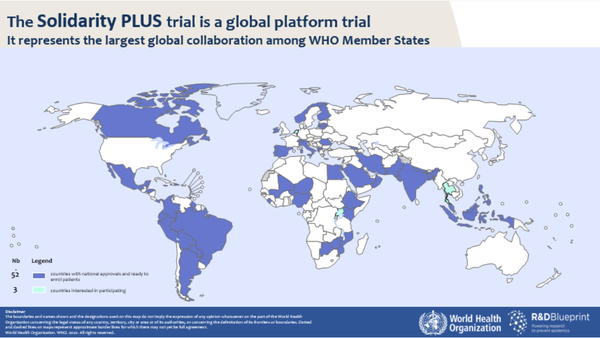The World Health Organization’s (WHO) global Solidarity Plus clinical trial advanced to a new phase to test three more candidate drugs in treating hospitalized Covid-19 patients.

WHO plans to run the Solidarity PLUS trial with hospitalized patients using artesunate, imatinib, and infliximab selected by an expert panel to reduce the death risk. The Solidarity PLUS study is a platform trial that represents the largest global collaboration among WHO members. It involves researchers from over 600 hospitals in 52 countries and 16 more nations that have not participated in the previous study.
The previous version of the study, the Solidarity clinical trial started in March 2020, aims to gather countries to conduct studies for developing therapy.
Artesunate, imatinib, and infliximab are used for treating severe malaria, cancers, and diseases of the immune system such as Crohn’s Disease and rheumatoid arthritis, respectively.
“Finding more effective and accessible therapeutics for Covid-19 patients remains a critical need, and WHO is proud to lead this global effort,” said WHO Director-General Tedros Adhanom Ghebreyesus. “I would like to thank the participating governments, pharmaceutical companies, hospitals, clinicians, and patients, who have come together to do this in true global solidarity.”
The trial would allow assessing various therapies in thousands of patients to see how the drugs reduce mortality or moderate therapeutic effects. It also helps the organization check which new treatments could be added and drop ineffective therapies during the study.
Previously, four drugs were evaluated by the trial. The results showed that remdesivir, hydroxychloroquine, lopinavir, and interferon had little or no effect on hospitalized patients with Covid-19.
Participants in the study would receive 2.4 milligrams per kilogram of artesunate every 12 hours for the first day and take the drug once a day for a total of seven days.
Artesunate, manufactured by Ipca Laboratories in India, is a derivative of artemisinin extensively used to treat malaria and other parasitic diseases for over 30 years. As a result, WHO Covid-19 advisors recommended evaluating the anti-inflammatory properties of artesunate.
In Korea, Shin Poong Pharm has submitted its plan to conduct a phase 3 clinical trial of Pyramax (ingredient: artesunate) after failing to present statistically significant results in the previous study phase.
The phase 2 study was performed on 113 patients in 13 domestic hospitals to evaluate the efficacy and safety of Pyramax in treating mild to moderate Covid-19 symptoms.
A 400 milligram of Novartis Imatinib, targeted therapy for hematological malignancies, would be taken orally once a day for two weeks for Covid-19 patients to assess the efficacy.
The dose used is the standard amount for patients with hematological malignancies given over extended periods.
A randomized clinical trial in the Netherlands showed a potential clinical benefit of imatinib for hospitalized Covid-19 patients.
Many domestic pharmaceutical companies, including Donga ST, Boryung Pharmaceutical, Chong Kun Dang, Korea United Pharm, JW Pharmaceutical, Hanmi Pharmaceutical, also have developed generic drugs of Novartis’ Imatinib as the patent went void in 2013.
Johnson and Johnson’s infliximab would also be infused to hospitalized patients five milligrams per kilogram for two hours, the standard dose given to treat psoriasis. The drug has been used to treat immune diseases in adults and children.
Infliximab is a tumor necrosis factor-alpha (TNF-a) inhibitor, a chimeric monoclonal antibody that recognizes human TNF-a. WHO advisors recognized the feasibility of the drug to demonstrate efficacy and safety in restricting broad spectrum inflammation, including in elderly populations who are most at-risk to Covid-19.
Janssen Korea supplies the original drug Remicade (ingredient: infliximab), and Celltrion and Samsung Bioepis are providing biosimilar drugs Remsima and Remaroche in Korea.

